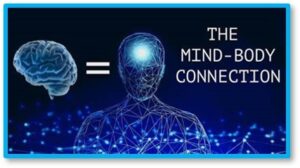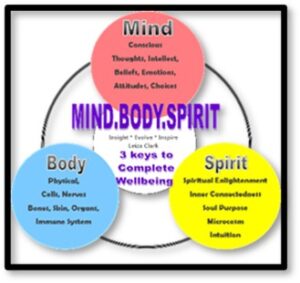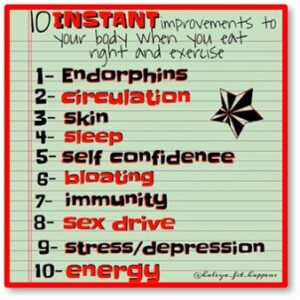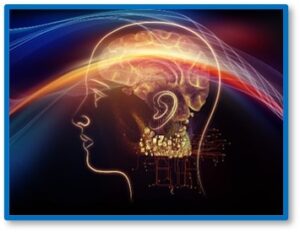Monday Author: Susanne Skinner
“If you think your body and mind are two, that is wrong; if you think that they are one, that is also wrong. Our body and mind are both two and one.” ~ Shunryu Suzuki
The mind and the body are not two separate entities, although they are often considered interchangeable. They work together to nurture physical and emotional health, intertwined in what’s known as the mind-body connection.
 Chemistry and biology impact our moods, emotions, thoughts and beliefs. When these factors combine, they play a major role in influencing our levels of emotional stress and physical well-being.
Chemistry and biology impact our moods, emotions, thoughts and beliefs. When these factors combine, they play a major role in influencing our levels of emotional stress and physical well-being.
The many ways we think, feel, and act are triggers for bodily responses. Positive emotional responses influence longevity. By developing good mental and physical health we create a strong mind-body connection. Both require balance for good health, immunity, and fitness—especially when you are looking at fifty in the rear-view mirror.
Healthy Body ~ Healthy Mind
The mind differs from the brain by virtue of one simple fact. The brain is tangible; the mind is not. The brain is an organ whereas the mind is the realm of intellect and thought. A healthy mind-body connection links our beliefs, attitudes, and behaviors and underwrites positive physical health.
Surprisingly, mental health professionals continue to differ on the definition of the mind. The default of a healthy mind used to be the absence of mental illness, with not much thought given to a bodily connection.
 Three hundred years ago, medicine treated the mind and body as one. During the 17th century the western world began to view them as distinct. Doctors treated the body as having fixable and replaceable parts not connected to the mind.
Three hundred years ago, medicine treated the mind and body as one. During the 17th century the western world began to view them as distinct. Doctors treated the body as having fixable and replaceable parts not connected to the mind.
Strides in twentieth-century medicine continue to confirm strong connections between the mind and body. Studies prove our senses take in information from the environment, sending electrical signals through the nervous system, where the brain gives them meaning. The brain then releases neurochemicals. These send electrical signals to regulate the body and control movement, influencing our mental and physical well-being.
In his book “Understanding the Mind-Body Connection | Balanced Achievement,” Dr. James Gordon says,
“The brain and peripheral nervous system, the endocrine and immune systems, and all the organs of our body and all the emotional responses we have share a common chemical language and are constantly communicating with one another.”
In other words, there is a mind-body connection in all of us.
The Benefits of Physical Fitness for the Mind
Physical fitness strengthens the mind- body connection, which in turn strengthens our emotional health. Being active burns calories but engaging in targeted and diverse forms of exercise increases endurance, heart health, muscle strength and coordination. Practicing cardio-respiratory fitness increases mental fitness.
Conversely, poor emotional health weakens the body’s immune system. We’re more likely to develop colds or other illnesses when going through emotionally difficult times, causing us to ignore our health by not exercising or eating in balance. This often leads to poor sleep quality; depriving our body of rest, weakening our mental and physical connection and the body’s ability to heal.
The Power of Endorphins
 Endorphins are happy hormones. The word endorphin comes from the words endogenous, meaning from within the body, and morphine, an opiate pain reliever. Endorphins are natural pain relievers that give the body a natural high.
Endorphins are happy hormones. The word endorphin comes from the words endogenous, meaning from within the body, and morphine, an opiate pain reliever. Endorphins are natural pain relievers that give the body a natural high.
The central nervous system and the pituitary gland produce endorphins. These act on the opiate receptors in our brains, reducing pain and boosting pleasure. The body releases endorphins in response to discomfort or stress, along with activities like laughing, eating and exercise.
These actions produce chemicals known as neurotransmitters—messengers between gaps called synapses in our nerve cells. The number of neurotransmitters in the synapse at any given time determines a person’s mood.
Benefits of Endorphins:
- Reduce stress and anxiety
- Regulate appetite
- Support weight reduction
- Pain management
- Alleviate depression
- Boost self esteem
There is a direct connection between a positive attitude and a healthy body. According to the Mayo Clinic, positive thinking increases the length and quality of life while decreasing levels of depression and stress. It also reduces the risk of death from cardiovascular disease and develops stronger coping skills to see you through the tough times.
Neural Pathways
When I began my physical fitness program, I found it difficult to regain some of my flexibility—a result of damaged neural pathways.
 Neural pathways are like a highway or connection for electrochemical signals to communicate information between areas of the nervous system.
Neural pathways are like a highway or connection for electrochemical signals to communicate information between areas of the nervous system.
Humans are born with a blank slate. We create these pathways as we grow. A neural pathway forms when a new thought or piece of information is perceived for the first time. Repetition builds stronger and more dominant pathways in your brain until they become second nature.
To put it simply, some of my connections were lost during my illness, requiring me to rebuild and develop new ones. By increasing and varying my exercise routines I began to form new neural pathways. I did this by repeating a particular action (in my case exercises) until my brain defined a new permanent pathway—a process that takes roughly three weeks.
Remember to Rest
The design of the human body includes rest and repair. Take time for both to recharge yourself physically and mentally. Resting and sleeping allow the body and brain to re-energize and maintain their vital functions. Strong mental and physical health require rest and restoration every single day, allowing us to live longer and age gracefully.

